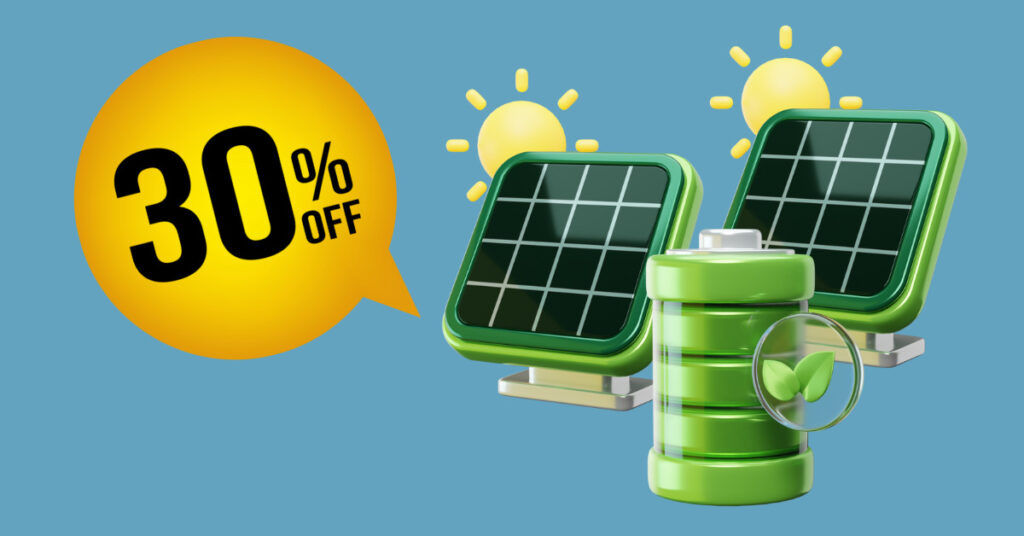Introduction
Are you curious about solar tax credits in Idaho and how they could benefit your transition to clean energy? Understand available incentives to offset costs as more people switch to solar power for homes and businesses.
| Key Takeaways |
|---|
| Idaho offers both federal and state solar tax credits that can greatly reduce the cost of installing a photovoltaic (PV) system. |
| The state solar tax credit allows homeowners to claim 40% of the total cost of their solar installation as a deduction on their personal income taxes, up to $5,000. There is no expiration date for this incentive. |
| Other incentives offered by Idaho include net metering, property tax exemption, utility rebates, and a no-cost solar program. |
| Eligibility criteria and deadlines apply when claiming Idaho's state solar tax credit, so it's important to consult with professional installers and submit your application in time. |
Understanding Solar Tax Credits In Idaho
Homeowners and businesses in Idaho can utilize federal and state solar tax credits to reduce the cost of their photovoltaic (PV) system installation.
Federal Solar Tax Credit
The Federal Solar Tax Credit, officially known as the Investment Tax Credit (ITC), is a nationwide incentive encouraging homeowners and businesses to switch to solar power.
It provides significant financial benefits by reducing the overall cost of installing a solar panel system.
For instance, if you invest $26,000 in a solar energy system in Idaho, you would receive an impressive $7,800 reduction on your federal income taxes – substantially decreasing the total out-of-pocket expense for going green with solar power.
Remember that this valuable tax break is set to decrease gradually over time. However, it remains available until 2032.
State Solar Tax Credit
Idaho offers a state solar tax credit that can significantly reduce the cost of installing solar panels for homeowners. This tax credit allows Idaho residents to claim 40% of the total cost of their solar installation as a deduction on their personal income taxes, up to $5,000.
Unlike the federal solar tax credit, which is set to decrease in value over time and will eventually expire in 2032, Idaho’s state solar tax credit has no expiration date.
For example, if you installed a $15,000 PV system at your home in Idaho and qualify for the state tax credit, you could save $6,000 on your personal income taxes ($15k x 40%).

Idaho’s Solar Policies And Incentives
Idaho offers a range of solar policies and incentives, including net metering, sales tax exemption, residential alternative energy tax deduction, and the energy efficiency tax credit.
Net Metering
Another incentive offered by Idaho for solar energy users is net metering. This practice allows homeowners to return any excess electricity from their solar panels to the utility company.
With solar energy, homeowners gain energy independence and long-term savings on their energy bills, which can be reinvested into their homes or business. By generating their electricity, homeowners can also avoid price increases from utility companies. Additionally, they contribute to reducing greenhouse gas emissions and their dependence on fossil fuels. Gas emissions and their reliance on fossil fuels. With solar energy, homeowners gain energy independence and long-term savings on their energy bills, which can be reinvested into their homes or business. Overall, going solar can be an intelligent investment for homeowners and businesses.
Did you know? Idaho is one of over 40 states in the US that offer some form of net metering policy for residential solar installations, making it an attractive option for anyone looking into sustainable sources of energy!
Sales Tax Exemption
Idaho’s sales tax exemption is a great incentive for those who want to go solar. Solar equipment is exempt from Idaho sales tax, saving homeowners thousands on installation costs.
For instance, a $15,000 solar panel system would typically require an additional $1,200 in sales taxes (8% average rate). But with the exemption program, homeowners can avoid the added costs and save on their investment.
Energy Efficiency Tax Credit
Idaho offers an Energy Efficiency Tax Credit to incentivize homeowners to invest in energy-efficient upgrades. This tax credit provides a 20% credit, up to $500, for qualifying home improvements that improve the energy efficiency of residential properties.
Qualifying improvements include upgrading insulation, installing efficient windows and doors, or using high-efficiency heating and cooling systems. Homeowners can claim this tax credit once every three years.
In addition, Idaho also has a Residential Alternative Energy Tax Deduction program that allows homeowners to deduct 40% of the cost of a PV system from their personal income taxes in the first year after installation.
Residential Alternative Energy Tax Deduction
Idaho offers a residential alternative energy tax deduction to homeowners who install solar panels on their homes. The tax credit lets homeowners deduct 40% of the total cost of a PV system from their income taxes.
For instance, a homeowner spending $20,000 on an eligible system can get an $8,000 state tax credit for installing solar panels. This incentive offsets the upfront costs of going solar and encourages renewable energy investment by residents.
Eligibility And Claiming Idaho’s State Solar Tax Credit
To be eligible for Idaho’s state solar tax credit, homeowners must install a PV system and pay out of pocket. Additionally, the system must meet specific criteria outlined by the Idaho State Tax Commission.
Qualifying Criteria
To qualify for Idaho’s state solar tax credit, homeowners must meet specific criteria. First and foremost, the residential property must be located in Idaho. Additionally, only photovoltaic (PV) systems are eligible for the tax credit – other types of renewable energy systems do not qualify.
In terms of installation, the PV system must be new and paid out-of-pocket by the homeowner to be eligible for the state tax credit. Leased systems or installations where financing was obtained through a third party are not eligible.
Applying For Tax Credits
To claim the Idaho state solar tax credit, homeowners must submit their taxes with the necessary forms. Here’s what you need to know about applying for tax credits in Idaho:
- Qualifying Criteria: To qualify for the state solar tax credit, your solar panel system must meet certain requirements of the Idaho State Tax Commission. Check their website and consult a professional installer to ensure your system is eligible.
- Applying for Tax Credits: When filing your taxes, complete Form 45S and attach it to your return. You’ll need to provide proof of purchase and installation costs along with the form.
- Deadlines and Restrictions: Submit the state solar tax credit form by April 15th of the year following installation. There’s a cap on how much credit can be claimed annually, so file early if possible.
- Federal Solar Tax Credit: To claim the federal tax credit, homeowners must complete Form 5695 and attach it to their income tax return. This form is available on the IRS website.
- File Form 3834: Nonprofits, schools, and municipalities can use cash payment instead of federal tax credits by filing Form 3834 with their income tax return.
Remember that both federal and state tax credits are subject to change depending on legislation or government policy updates. Keep an eye on these changes to optimize your savings for going solar in Idaho!
Deadlines And Restrictions
To maximize Idaho’s state solar tax credit, homeowners should be aware of the program’s deadlines and restrictions. First off, there are specific criteria that residents must meet to qualify for the incentive.
For the solar installation to qualify, it must power a residential property in Idaho and not be leased or financed by a third party.
Homeowners have one year to apply for the tax credit after completing their solar installation project. Although non-refundable, the credit can be carried over for up to three years if not used in full during the tax filing season.
Other Incentives For Going Solar In Idaho
Idaho also offers property tax exemptions, utility rebates, and a no-cost solar program for low-income households to encourage more residents to switch to renewable energy.
Property Tax Exemption
Homeowners in Idaho who install solar panel systems are eligible for a property tax exemption. They can avoid paying additional taxes on the added value of their home from a solar system.
Essentially, a solar panel system won’t increase property taxes assessed by local governments.
Additionally, Idaho offers incentives to encourage residents to switch to renewable energy sources. The property tax exemption is one of them.
Utility Rebates
One of the additional incentives for going solar in Idaho is the availability of utility rebates offered by various utility companies. These rebates help homeowners and businesses save even more on their solar installations. Below is a table detailing some of the utility rebates available in Idaho.
| Utility Company | Rebate Program | Rebate Amount |
|---|---|---|
| Idaho Power | Solar Power Incentive Program | Up to $0.50 per watt for residential and small general service customers, up to $0.25 per watt for large general service and irrigation customers |
| Avista Utilities | Renewable Energy System Incentive Program | $0.50 per watt for residential systems, up to $5,000; $0.35 per watt for commercial systems, up to $15,000 |
| PacifiCorp (Rocky Mountain Power) | Blue Sky Community Project Funds | Varies depending on the project, typically for nonprofit organizations and public institutions |
Combining utility rebates with Idaho solar tax credit and federal tax credit can significantly reduce solar installation costs and expedite your return on investment. Check with your local utility company for eligibility and requirements for rebates. Rebates may be subject to change or availability on a first-come, first-served basis.
No-Cost Solar Program
Residents in Idaho can switch to solar with Idaho Power’s No Cost Solar Program. The program offers free installation and maintenance of solar panel systems, leading to lower electricity bills. Homeowners must meet certain eligibility criteria, including having a good credit rating and a suitable roof for solar panels.
Residents can reduce their carbon footprint and save money by participating in the No Cost Solar Program. Participants in the program get monthly payments based on their solar panels’ energy generation. Idaho Power provides these incentives in addition to free installation and maintenance.
However, those who don’t qualify for the No Cost Solar Program can still benefit from other incentives, such as Idaho’s State Solar Tax Credit and the federal solar investment tax credit. These incentives can significantly reduce the cost of installing a solar panel system, making it more affordable for homeowners.
Conclusion
In summary, Idaho offers a variety of solar incentives and tax credits for residents looking to switch to clean energy. Going solar in Idaho is affordable, with no-cost solar programs, tax exemptions, and deductions.
The residential alternative energy tax deduction and federal solar tax credit offer additional savings for homeowners who switch to photovoltaic power.
Solar partner in Idaho
If you’re interested in transitioning to clean energy and curious about solar tax credits in Idaho, you’re in the right place. Understanding the available incentives is essential for offsetting the costs associated with solar power for homes and businesses. If you have any questions about solar or want to install a system, DroneQuote is your trusted partner in Idaho. Contact us today to learn more.
FAQs
- Does Idaho have a solar tax credit?
Idaho offers a state income tax credit for qualified solar energy systems. Other renewable energy sources, such as wind turbines and geothermal heat pumps, are also eligible.
- How much is the solar tax credit in Idaho?
The solar tax credit in Idaho equals 40% of the system’s total cost, including installation, up to a maximum of $5,000 per year. There are also additional federal incentives that may further reduce out-of-pocket expenses.
- What are the requirements to qualify for the Idaho solar tax credit?
To qualify for Idaho’s State Solar Tax Credit, your system must meet technical performance standards set by industry professionals and be located in the state. Then you must submit an application with documentation certifying eligible expenses from previous taxable years. The property owner must own or lease their home.
- When does the Idaho solar tax credit expire?
Homeowners and business owners have access to a tax incentive. This provision will last until December 2026 unless it’s extended again. Changes may occur based on political shifts among policy-makers over time. Interested individuals should confirm eligibility criteria with local experts. This is recommended to account for potential variances before submitting applications.



